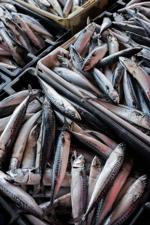
Mackerel bait was hard to come by last year due to seals eating them as well as DFO quotas. Rachel Peters Photography photo
Lobster fishers have had to contend with the rising costs of doing business for years, but this season presents a set of circumstances perhaps without compare.
Fuel prices are higher than they’ve ever been on PEI and that will have a direct impact on fishers, especially the ones who sail further out from shore.
Depending on where you look, diesel prices last week were more than 70 cents higher than during the height of the 2021 lobster season. Regular prices were about 40 cents higher, according to Stats Canada.
Throw in rising bait prices driven by quotas and feeding predators, and insurance costs, and it could take a sizable big bite out of profit margins.
“It’s going to be different from last year for sure. The cost of everything is going up,” said Naufrage lobster fisherman Lucas Lesperance. “Even for anyone travelling to the wharf in the morning, it’s costing the captains and the crew more money. The price of fuel goes up but everything else stays the same.”
He hopes those pressures will create a strong price throughout the season.
Mr Lesperance said seals are becoming more of a nuisance than ever, chowing down on bait species like herring and mackerel. A seal hunt would certainly help, he said.
On top of that, shark sightings near the Island were common last summer.
“It’s the same old story, they’re not here to lose weight,” he said. “They’re changing their migration paths and here they are.”
He has a lot of bait still in the freezer that he fished last summer and fall. That’s always an option for lobster fishers, but it’s far more expensive to do that now with the fuel prices.
Charlie McGeoghegan, chair of the PEI Lobster Marketing Board, said lower quotas on mackerel and herring last year were a problem, in combination with seals eating bait, and he’s tried to get that across to the Department of Fisheries and Oceans.
“DFO’s basing the quota on the stock, but what’s affecting the stock is the seals, we want to see something done with them to protect our bait industry.”
He said he’s heard rumblings the new DFO minister, Joyce Murray, does see this as an issue so he’s hopeful something will happen.
“The seals are 800 to 1,000 pounds each and they’d be eating 60 to 80 pounds of fish a day. We’re talking hundreds of thousands of these seals.”
In fact, having more sharks around could be a plus because they eat seals, he said.
The cost of bait, having gone up from 30 to 40 cents a pound 10 years ago as high as $2 now, doesn’t help.
In terms of fuel prices, Mr McGeoghegan said this will be especially hard on the fishers who burn as much as 400 litres a day.
“It should put lobster prices up because it definitely costs more to go get them. If you look at other industries, that’s usually how they work.”
In that sense, early returns from Nova Scotia are promising. In zones there with the season already underway, the price has been between $17 and $18 per pound, which Mr McGeoghegan said would be a record for this time of year.
There’s also nothing in storage from last year which bodes well for prices, he said.
Rising fuel, bait prices could eat into profit margins - peicanada.com
Read More

No comments:
Post a Comment